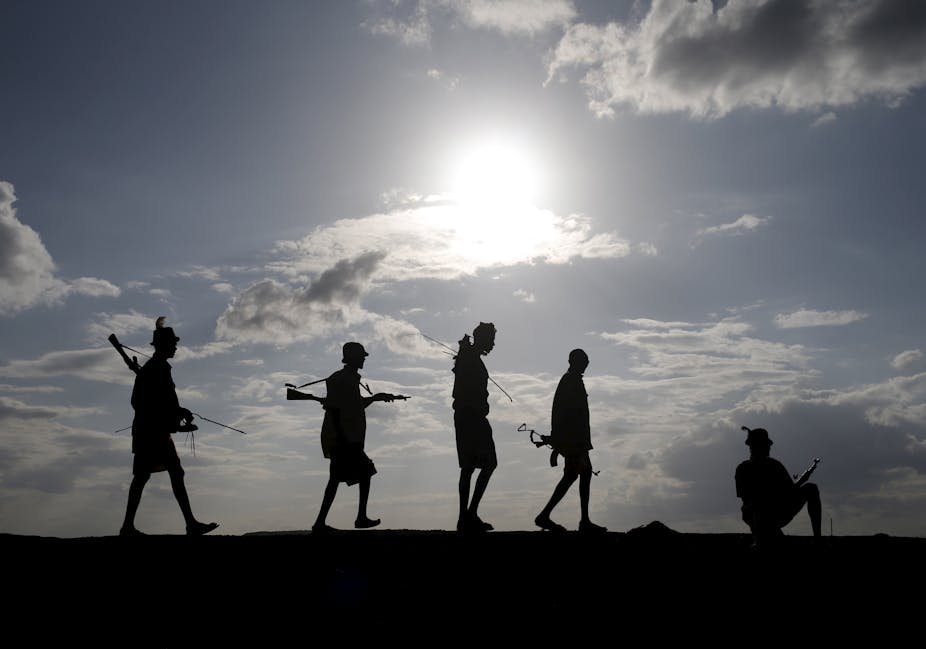There would appear to be little in common between recent news reports of armed raids in rural Nigeria and Kenya. The first involved the raiding of farming communities in Nigeria by armed Fulani livestock herders. The second was cattle raiding by well-armed groups in northern Kenya.
But the different narratives and causes have a common thread – the easy access to modern automatic weapons.
The proliferation of small arms across many regions of Africa affected by conflict – or adjacent to chronic conflicts – have brought misery. But it has also provided a means for lawless groups to supplement the meagre rewards of nomadic pastoralism through raiding or other forms of violence.
The idea of shifting identities that all have possession of weapons as a core element is brilliantly captured in Marielle Debos’s new book Living by the Gun in Chad. The possession of weapons to prosecute war, earn a livelihood or provide for or protect one’s own community could be applied to many African conflict societies.
This excellent and innovative book describes the concept of the “inter-war” as state of not war but not peace in Chad. Debos captures it well in her thoroughly researched book, arguing that being armed and experienced in the use of arms becomes a practical occupation or profession which
refers to the activities of those who have lived by the gun for years, being alternately or simultaneously soldiers, rebels and road bandits.
“Guns are changing things”
This phenomenon is not entirely new. In 2001 Michael Fleshman wrote an important account of the negative effects of the wide availability of small arms in eastern and central Africa. In the article Counting the cost of gun violence, Fleshman recounted how automatic weapons from conflicts in Somalia, Sudan, Ethiopia and Uganda had transformed a centuries old problem of cattle raiding in northern Kenya.
New firepower had turned raids between neighbouring groups and communities from small-scale violence into serious community conflicts. The impact of modern military weapons
was brought tragically home in early 2001, when Pokot youth opened fire on a rival settlement, killing 47 people, burning down the village and transforming the almost-ceremonial tradition of cattle raiding into an occasion for human slaughter.
Fleshman quoted a young Pokot man as saying: “Guns are changing things”.
Those words may have been uttered by George Omona in his account of the violent, criminal and hand-to-mouth existence of the nomadic Lord’s Resistance Army. The central character in When the Walking Defeats You, a new book on the violent group, says:
A gun should make your stomach full and you rich.
Ending the war is not enough
The examination of Chad’s armed men is fascinating in its depiction of a country that for over 50 years has existed either in a state of war or what Debos calls inter-war,
the spaces and times that are affected by violence even if there is no direct fighting between rebel and governmental force.
Ex-combatants in Chad act as unofficial revenue gatherers on roads or at borders purely by virtue of having guns and links to well-known armed factions or the national army.
Even in countries like Kenya and Nigeria the inter-war is relevant as a situation in which conflict exists outside what would be labelled a war. Even though not recognisable as war, for communities affected by raiding or the violence of armed groups the absence of war certainly doesn’t mean peace.
The possession of guns by groups of individuals, communities or factions of political or insurgent groups enables them to pursue political ends. But it also enables them – and this is the focus here – to extort or exact unofficial taxes or tolls or thieve their way to a livelihood derived from the threat – or use – of violence.
The persistence of the problem of small arms proliferation is one that is periodically the subject of appeals to the UN or calls by the Security Council. But calls for action to disarm and demobilise armed groups after conflict remain largely that.
Governments in conflict or former conflict zones often have vested interests in maintaining informal armed groups beyond the army and other state security forces. As Debos repeatedly demonstrates in Chad, this can be for the entrenchment of political elites, the garnering of rents through armed extortion or as potential weapons against hostile neighbours.
The over-arching problem, according Debos, is that
Ending the war is not enough. The issue is to escape the inter-war situation maintained and reproduced by the state.

